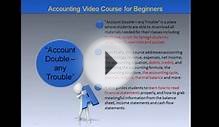
Financial Accounting for Beginners
This section offers free online tutorials of the accounting basics.
The lessons shall serve as a primer for beginners and a refresher for those who already have background in accounting.
This course aims to build and solidify one's knowledge of the fundamentals which are vital in pursuing higher accounting studies, in building a career in accounting, or in managing a small business.
This chapter provides a fresh look into accounting. We will define accounting and break the definition down into simple points; learn about the role of accounting in the financial world, its branches, areas of accounting practice, and the types and forms of businesses.
This chapter covers the core concepts in accounting that you need to know before moving on to the more intricate topics. The concepts here will serve as the foundation upon which your accounting knowledge will build upon.
The preparation of the financial statements is the seventh step in the 9-step accounting cycle. However, we decided to present this first before getting into the whole process for you to have a picture of what we are trying to produce in an accounting system.
This chapter deals with the first 4 steps of the 9-step accounting cycle. The first four steps actually represent the analyzing, recording, and classifying phases of accounting.
Adjusting entries are made to update the accounts in the accounting system. Some accounts are not up-to-date hence requiring adjustments to get them to their correct balances. Adjusting entries are made for accrual of income, accrual of expense, deferrals, prepayments, depreciation, and allowances.
Most businesses today have automated accounting systems. Financial statements can be prepared with a few clicks of a button. However, as accountants, we need to know how to prepare them manually and make it a part of our system. We will also be able to interpret and analyze financial statements better.
Closing journal entries are made at year-end to prepare temporary or nominal accounts for the next accounting period. The amounts of nominal accounts in one period should be closed or brought to zero so that they won't be mixed with those of the next period.
The last step in the accounting cycle is to prepare a post-closing trial balance. A post-closing trial balance is prepared after closing entries are made and posted to the ledger. It is the third trial balance in the accounting cycle.
Preparing reversing entries is an optional step in the accounting cycle. Reversing entries are made at the beginning of the new accounting period to enable a smoother accounting process.
Start playing Brawl pirates online Today
YOU MIGHT ALSO LIKE



Share this Post
Related posts
Financial Accounting for Manager
Financial accounting manager positions are available in a wide range of organizations, including companies that focus specifically…
Read MoreAccounting for Financial Services
Associated Students (A.S.) Accounting and Financial Services provides many amenities to all CSUN students, especially when…
Read More










